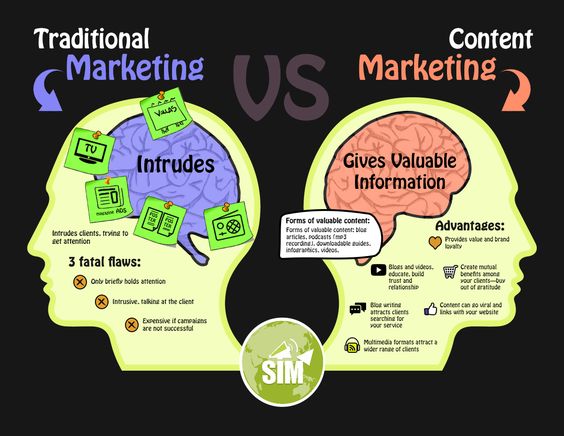Content Marketing
What is Content Marketing?

Definition:
“Content Marketing” is a strategic marketing approach focused on creating and distributing valuable, relevant, and consistent content to attract and engage a target audience. The primary goal of content marketing is to build trust, establish authority, and ultimately drive profitable customer actions, such as purchasing a product or service. Content marketing involves various forms of content, including blog posts, articles, videos, infographics, podcasts, and social media posts.
Analogy:
Think of Content marketing as storytelling. Similar to how storytelling captivates an audience by conveying a narrative, content marketing captivates and informs the audience by delivering valuable information, solving problems, or entertaining them, with the underlying goal of building a relationship and driving desired actions.
Further Description:
Content marketing revolves around understanding the needs and interests of the target audience and creating content that resonates with them. It involves the entire content lifecycle, from content strategy and creation to distribution and analysis. The content created should be informative, relevant, and tailored to address the pain points or aspirations of the audience. Through consistent content creation and distribution, businesses can position themselves as industry leaders and cultivate a loyal customer base.
Why is Content Marketing Important?
Content marketing is crucial for several reasons:
Building Trust and Credibility: By consistently providing valuable content, businesses can build trust with their audience, positioning themselves as knowledgeable and reliable sources of information.
Audience Engagement: Engaging content captivates the audience’s attention, encourages interaction, and fosters a sense of community around a brand.
Search Engine Optimization (SEO): Quality content is a key factor in search engine rankings. Well-optimized and relevant content helps businesses appear in search results, driving organic traffic.
Lead Generation: Informative and valuable content serves as a magnet for potential customers, attracting them to the brand and converting them into leads.
Customer Education: Content marketing provides an avenue for educating customers about products, services, and industry trends, contributing to informed purchasing decisions.
Examples and Usage:
- Blog Posts and Articles: Regularly publishing blog posts and articles that address common challenges or provide insights relevant to the audience.
- Social Media Content: Creating engaging content for social media platforms to connect with the audience, share updates, and encourage interaction.
- Videos and Webinars: Producing informative videos or hosting webinars to visually communicate complex concepts or showcase products.
- Infographics: Using visually appealing infographics to convey data, statistics, or step-by-step processes in a digestible format.
Basically, Content marketing is a strategic approach focused on creating and distributing valuable, relevant content to attract and engage a target audience, with the ultimate goal of driving profitable customer actions.
For example, an e-commerce business might employ content marketing by creating blog posts about fashion trends, producing video tutorials on styling, and sharing engaging social media content to build a community around its brand.
Key Takeaways:
- Content Marketing involves creating and distributing valuable, relevant content to attract and engage a target audience.
- It aims to build trust, establish authority, and drive profitable customer actions, such as purchasing a product or service.
- Examples include blog posts, social media content, videos, webinars, and infographics.
- Content marketing is essential for building trust, engaging the audience, improving SEO, generating leads, and educating customers.




